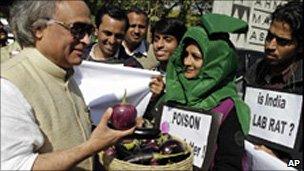Jairam Ramesh shakes up India's environment ministry
- Published

Mr Ramesh says he is a firm advocate of the consultative process
India's environment ministry led by Jairam Ramesh is becoming increasingly assertive. The construction of dams, power and steel plants have all been delayed by him and he has spoken out against fuel-guzzling big cars.
Mr Ramesh's decisions have pitted him against big business and his ministerial colleagues.
In recent months he has kicked up a storm with his efforts, which he says are in order to balance development with the preservation of the environment.
In several instances he has blocked major industrial development on environmental grounds, angering those who say such projects would boost India's economy. Some recent decisions have also been criticised by environmentialists - he gave the go-ahead to a new Mumbai (Bombay) airport and a nuclear power station in Maharashtra state.
On Thursday, attending climate talks in the Mexican city of Cancun, Mr Ramesh stirred further controversy when he suggested India might be willing to accept binding cuts in carbon emissions - something it has opposed until now.
But over the past year, Mr Ramesh will probably be remembered for saying "no" more often than he has said "yes".
Last month, the construction of a $2bn (ВЈ1.25bn) dam - the largest in southern India - was thrown into doubt when Mr Ramesh's ministry said it had not yet met the conditions to receive environmental clearance.
The enormous reservoir the dam will create will flood hundreds of villages, making about 200,000 people homeless. Mr Ramesh said the dam would not be allowed to go ahead until local views had been heard.
A similar thing happened in October, when a committee appointed by Mr Ramesh's ministry advised that the country's single largest foreign investment, a $12bn (ВЈ7.4bn) steel plant - to be built by the South Korean company Posco in Orissa state - should not go ahead because of environmental concerns.
Cracking down
In August his ministry rejected controversial plans by mining group Vedanta to extract bauxite in Orissa. Mr Ramesh said the project had breached environmental protection acts and raised concerns for the rights of local tribes.
And in recent weeks, Mr Ramesh's ministry stopped the construction of a luxury housing complex on a hill station close to the western city of Mumbai (Bombay), saying it had not secured requisite environmental clearances.
Earlier this year Mr Ramesh's ministry denied permission for commercial cultivation of BT brinjal - a strain of genetically modified (GM) aubergine.
Before taking the decision he held a series of national consultations to help him decide whether to allow the genetically modified version of the vegetable to be grown in India.
For the first time in India's history, the environment ministry is being seen as proactive and assertive under Mr Ramesh's stewardship, say his supporters.
"The environment ministry used to be an also-ran ministry before Mr Ramesh took over. He has given the ministry a high profile in face of opposition even from the prime minister's office," Outlook magazine editor Vinod Mehta said.
Environmentalist Vandana Shiva says Mr Ramesh is the first environment minister who is "doing what he is expected to do".
"He realises that a political balance has to be struck between unchecked liberalisation and demands of the local people."
For his part Mr Ramesh says he is only asking for "procedures to be followed and laws to be abided".
An engineering graduate from the Indian Institute of Technology and the Massachusetts Institute of Technology, Mr Ramesh, 56, is a technocrat turned politician.
He worked with the World Bank and as an adviser with India's Planning Commission before joining the ruling Congress party.
Political backing
Mr Ramesh is said to have the backing of the powerful Congress party chief Sonia Gandhi, and quit his post as a junior commerce minister to work for the party in the run-up the 2009 general elections.
His critics in the party say Mr Ramesh's assertive style has to do more with gaining political mileage and less with conviction.
Mr Ramesh is a technocrat turned politician
Analysts say that he has evolved from an ardent supporter of economic reforms in the late 1990s to a "green minister" who does not believe that development should come at the cost of environment.
"There was a time when Mr Ramesh used to say that land laws should be changed to allow for infrastructure projects. Now he has put a lot of restrictions on the industrial use of land," says Financial Express editor MK Venu.
Mr Ramesh's ministry is now seen by many as getting in the way of India's rising energy needs.
He has refused to allow coal mining in thickly forested areas, provoking the coal minister to say that development cannot be held hostage to environmental concerns. Four nuclear projects are also facing similar problems.
Some of the decisions by his ministry have become embroiled in controversy - especially those projects which have been cleared by state governments, raising questions about whether federal laws can override state laws.
Critics also feel that Mr Ramesh sometimes ends up playing to the gallery - last month he blamed fans of fictional boy wizard Harry Potter for their role in the dwindling number of wild owls.
In comments picked up by the press around the world, he said that Harry Potter books and films featuring his feathered friend Hedwig were so popular in India that they had contributed towards the demise of owls, because people were buying them from illegal bird traders.
But, on the whole, Mr Ramesh is clearly one of India's most assertive ministers - and it looks as if this darling of environmentalists has no intention of scaling back.
- Published19 October 2010
- Published24 August 2010